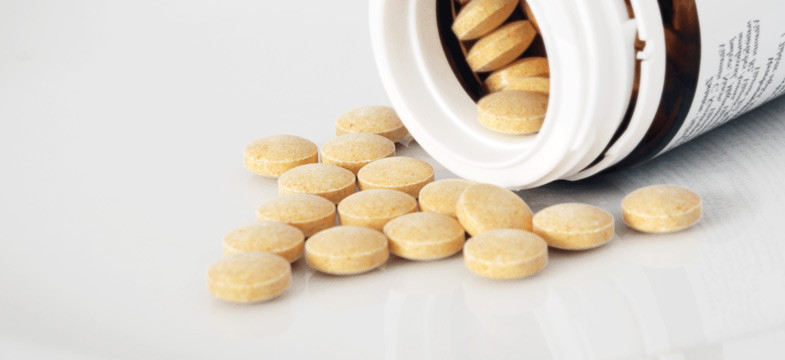Vitamin B12 Pills: Take Care When Choosing
Summary
|
What are the key features to look out for when buying vitamin B12 pills? How do you find the right supplements? Since the use of certain controversial additives makes vitamin B12 pills somewhat problematic, it is advisable to learn some of the basic distinctions before making your purchase. This article provides readers with all the information needed for this purpose.
Tablets and Lozenges
Among the vitamin B12 supplements available, pills are one of the most frequently chosen forms and their effectiveness has been well documented (1, 2). There are two main types of vitamin B12 pills:
Vitamin B12 lozenges and chewable tablets (sublingual)
Absorbed partly through the oral mucosaVitamin B12 tablets
Absorbed through the small intestine
On the one hand, lozenges can be useful if there are absorption difficulties in the intestines; on the other, they contain the most additives of all supplements. We will return to this topic in more detail later on. Firstly, however, it is important to look at the most obvious distinction between vitamin B12 pills: the vitamin content itself.
Vitamin B12 Active Ingredients
Not all B12 is the same; there are many different forms of vitamin B12, which are metabolised by the body in different ways. So, what are these active ingredients and how do they differ?
Currently there are four different active ingredients used in vitamin B12 pills, listed in the table below. All have proven to be therapeutically effective and suitable for treating vitamin B12 deficiency – yet there are some key differences.
Form | Natural Occurrence | Description | Further Information | For whom is it suitable? |
None, artificial form | Synthetic form, virtually never occurs in nature or in the body and cannot be directly utilised | Breaks down in the body into B12 and the toxin cyanide, therefore smokers should choose another active ingredient, and likewise so should those wishing to detoxify. Many conversion steps required to obtain a usable form of B12 from cyanocobalamin | Cheaper ingredient and very well researched. Good for covering the daily requirement in healthy people. Not suitable for smokers, nor detoxification | |
Foods, body cells, central nervous system | Bio-identical coenzyme, can be directly utilised | B12 circulates the body and cells in this form, therefore frequently used in supplements, detoxifying | Relatively expensive. Recommended for all applications | |
Foods, body cells, liver | Bio-identical coenzyme, form of B12 stored in the body, can be directly utilised | Form of B12 in the liver and mitochondria, detoxifying | Relatively expensive. Recommended for all applications | |
Foods, intermediate form in metabolism | Natural form of vitamin B12, as it is produced by microorganisms and found in foods. Keeps very well in the blood, ideal depot effect | Easier to utilise than cyanocobalamin, ideal depot effect. Also administered for detoxification purposes | Hardly available in pill form. Good for filling the body’s store and for detoxification. Recommended for all applications |
In our opinion the three natural vitamin B12 forms – methycobalamin, adenosylcobalamin and hydroxocobalamin – are the best active ingredients in vitamin B12 supplements. These forms occur naturally in our body and are found in vitamin B12 food sources.
Cyanocobalamin is an artificial form, shows numerous practical disadvantages and is not recommended by most naturopaths.
Vitamin B12 Lozenges or Normal Pills?
Vitamin B12 deficiency is often the consequence of an absorption disorder in the gut. Since the vitamin can also be absorbed via the oral mucosa however, vitamin B12 lozenges are potentially suitable for circumventing intestinal problems. Both methylcobalamin and cyanocobalamin have shown very good results in clinical trials with sublingual application and are today administered successfully (3).
At very high doses of 1000 µg or more, however, the advantage of sublingual absorption over normal pills is almost eliminated in most cases. This is because here the majority of the vitamin B12 content is absorbed via passive diffusion and thus absorption disorders are no longer a hindrance. In the case of parasite infestations, sublingual supplements could possibly be advantageous, but we are not aware of any research on this specific subject.
Dosages of Vitamin B12 Pills
The range of dosages for vitamin B12 pills is very wide; almost anything between 3 – 5000 µg is available. But which dosage is the right one?
The answer to this question completely depends on why the supplements are required in the first place. The daily requirement is set between 2.5 – 3 µg. However, it is vital to keep in mind the following point: only about 1.5 µg of B12 per dose can be absorbed by the body via the intrinsic factor (IF) – regardless of how high the dose is. In addition, another 1% of the does is obtained via passive diffusion, so that the actual B12 intake after the administration of a dose is a combination of both of these factors (4).
More exact information on dosing can be found in our article: Vitamin B12 Dosages – here we will only be providing a short overview.
Purpose | Dosage | Actual Amount Absorbed |
Refilling the body’s stores | 1000 – 2000 µg daily | 11 – 21 µg |
Daily requirement | 3 x 3 – 5 µg or 1 x 250 – 500 µg | 3 – 7 µg |
Therapy for absorption disorders | 300 – 1000 µg | 3 – 10 µg |
Any vitamin B12 that is not required will be excreted from the body unused. As a result, a vitamin B12 overdose is virtually impossible. The vitamin is hence usually slightly overdosed to secure an optimal supply (5).
How and When Should You Take B12?
Studies have shown that vitamin B12 should be taken on an empty stomach due to certain interactions it has with food. Various foods make the vitamin B12 uptake less effective, as a much smaller dose is absorbed.
Vitamin B12 Pills – Mainly Additives
Although vitamin B12 pills are certainly one of the most convenient supplement forms, they also contain major disadvantages. Pills can hardly be manufactured without auxiliary substances and therefore it is important to pay attention here to their contents – after all, one takes vitamin supplements for health reasons and surely consuming controversial additives is therefore highly undesirable. Vitamin B12 pills actually consist of additives to a large extent because the active ingredient makes up just a minor percentage of the total pill.
An even greater number of additives can be found in lozenges, since here not only the consistence of the pill has to be maintained, but also the taste and way it dissolves in the mouth. Controversial sweeteners, flavourings and colourings are found particularly often in lozenges.
Purity is an Important Characteristic
The purity of a vitamin B12 supplement is, in our opinion, a major sign of quality. Not only because additives can have an altogether negative impact on health, but also because it has not been completely clarified as to which additives affect the absorption of the vitamin content. The somewhat unstable coenzyme forms methylcobalamin and adenosylcobalamin in particular could be adversely effected in certain combinations. Unfortunately, there have been hardly any investigations into this so far.
Below is a list of the most commonly-found additives in pills, all of which are authourised and considered safe by the health authorities. Naturopaths take a different view here, in particular regard to artificial sweeteners, which are suspected to negatively effect the sugar metabolism and liver; it is fair to question if these substances should be used at all in vitamin supplements.
Since B12 is dosed in extremely small amounts in the microgram range, a supplement without any additives is not possible; at least cellulose or rice flour must be present as a carrier substance. Ideally, these are the only additives used, as most others are suspected of irritating the intestines, hindering absorption or other adverse effects.
Some additives are highly controversial. Our green to red marking shows the level of risk attached to different substances: green being safe and red being potentially dangerous, with yellow in between.
Additive | Observations |
Cellulose (E 460) | Harmless plant-based additive, which is excreted undigested by the body |
Microcrystalline cellulose | Like cellulose, can however pass through the intestinal wall, effects unknown, likewise no known negative effects |
Croscarmellose sodium | Made of cellulose, considered harmless |
Glycerin (E 422) | Chemically synthesised or plant-based, the latter considered harmless |
Di-calcium phosphate (E 341) | Harmless, can have a negative influence on the calcium balance when consumed in high quantities |
Stearic acid (E 570) | Saponification from plant or animal oils and fats, possible genetic engineering |
Silicon dioxide (E 551) | Made from sand, also approved for organic products. Often contains nanoparticles, the risks of which cannot yet be assessed |
Iron oxide (E 172) | Considered harmless |
Xylitol (E 967) | Made from birch bark, may have a laxative effect, possible genetic engineering |
Mannitol (E 421) | May have a laxative effect, possible genetic engineering |
Sorbitol (E 420) | May have a laxative effect, possible genetic engineering |
Stevia | Positive effects, but also negative effects as proven in animal experiments |
Magnesium stearate, magnesium salt of fatty acid (E 470 b) | Magnesium compounds of saturated fatty acid, may be plant or animal based, possible genetic engineering, adverse effects on the release of the active ingredient proven in studies |
Titanium oxide (E 171) | Considered harmless, however possibly carcinogenic in high doses, adverse effects in animal experiments. The risks of the frequently-occurring nanoparticles cannot be estimated |
Aspartame (E 951) | Sweetener, suspected of being extremely harmful, consumer protectors strongly advise against it, possible genetic engineering |
Vitamin B12 Pills vs Vitamin B12 Capsules
Vitamin B12 pills have proven to be very effective in vitamin B12 therapy and, according to numerous studies, are suitable for curing vitamin B12 deficiency and covering the daily requirement.
Capsules are nevertheless the preferential choice, as they are very pure and thus likely more effective and less damaging for the body. They are often produced with cellulose as the only additive and – together with vitamin B12 sprays, some of which contain almost only glycerine and the active ingredient – they are the purest form of B12 supplement.
Sources
- Andres, E., Dali-Youcef, N., Vogel, T., Serray, K. and Zimmer, J. (2009), Oral cobalamin (vitamin B12) treatment. An update. International Journal of Laboratory Hematology, 31: 1–8. doi: 10.1111/j.1751-553X.2008.01115.x
- Takasaki Y, Moriuchi Y, Tsushima H, Ikeda E, Koura S, Taguchi J, Fukushima T, Tomonaga M, Ikeda S, Effectiveness of oral vitamin B12 therapy for pernicious anemia and vitamin B12 deficiency anemia The Japanese Journal of Clinical Hematology [2002, 43(3):165-169]
- Sharabi A, Cohen E, Sulkes J, Garty M. Replacement therapy for vitamin B12 deficiency: comparison between the sublingual and oral route. Br J Clin Pharmacol 2003;56:635–638
- Berlin H, Berlin R, Brante G . Oral treatment of pernicious anemia with high doses of vitamin B12 without intrinsic factor. Acta Med Scand 1968;184:247-258
- Eussen SM, de Groot LM, Clarke R, et al. Oral Cyanocobalamin Supplementation in Older People With Vitamin B12 Deficiency: A Dose-Finding Trial. Arch Intern Med. 2005;165(10):1167-1172. doi:10.1001/archinte.165.10.1167.


